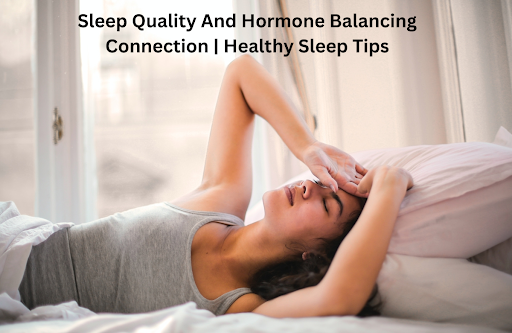Are you having difficulty sleeping well at night? Do you often wake up feeling exhausted, no matter how long you’ve been in bed? If this is something you can relate to, you are not alone. In today’s busy world, getting enough restful sleep can seem like a distant dream. But what you may not know is that hormone imbalance can be the thing that’s preventing you from having a good night’s sleep. When some hormones in the body are unbalanced, it can have a negative effect on your sleep, leaving you feeling tired and unfocused. Fortunately, this article will provide you with some tips and tricks for hormone balancing, so you can finally get the restful sleep you need. Get ready to say goodbye to those restless nights and welcome a healthier, more energized you!
How Sleep Quality And Balanced Hormones Are Co-Related?
Hormones such as melatonin tell the body it is time to rest, while cortisol wakes the body up in the morning. If these hormones are not in equilibrium, it can cause insomnia, difficulty staying asleep, and feeling lethargic and exhausted after waking up. So, it is important to maintain a balance of hormones in order to get a good night’s sleep.
Significance Of Hormone Balancing For A Quality Sleep:
- Hormone balancing can be beneficial in maintaining a healthy sleep-wake cycle. Hormone imbalances can also cause anxiety, depression, and mood swings. On the other hand, if hormones like cortisol, melatonin, and serotonin are balanced, they aid to manage your body’s circadian cycle, which is responsible for your sleep-wake pattern.
- Balancing hormones can help reset the body’s internal clock, leading to better quality and quantity of sleep. As a result, you will spend more time sleeping deeply and waking up feeling more energetic and rejuvenated. Also, achieving a balance in hormones can help the body regulate sleep and provide the energy needed to carry out daily activities.
- There are several hormones including cortisol, serotonin, dopamine, and adrenaline that can trigger sleep apnea and restless leg syndrome. Sleep apnea is a disorder that interrupts normal breathing patterns during sleep, resulting in exhaustion and lack of focus during the day. Restless leg syndrome is a neurological condition causing an overwhelming compulsion to move the legs while asleep, leading to sleep disruption and daytime fatigue.
Hence, it is imperative to maintain optimal levels of these hormones to ensure restful sleep. Doing so can help reduce the frequency and severity of these sleep-related disorders.
Suggestions / Tips To Assist With Hormone Balancing:
-
Foods To Include For Hormone Balance:
In order to regulate your hormones and encourage a better night’s sleep, think about including foods and items that promote hormonal balance in your diet. For instance, foods that are high in melatonin, such as cherries, oats, and walnuts, can raise your melatonin levels naturally.
-
Managing Stress to Balance Hormones:
To maintain optimal hormone levels, it is important to manage stress. An excess of cortisol, the stress hormone, can disrupt sleep. To counteract this, relaxation techniques such as deep breathing or meditation can be used to help control cortisol levels.
-
Exercises To Support Sleep Quality:
Additionally, it is advisable not to engage in strenuous physical activity shortly before bedtime, as this can elevate cortisol levels and interfere with sleep. However, hormone-balancing exercises can aid in stabilizing hormones and enhancing sleep quality.
-
Improved Sleeping Habits:
Creating good sleeping patterns is essential for achieving a good quality of sleep and regulating hormones. Going to bed at the same time each night, avoiding the use of electronic devices before going to bed, and creating a comfortable sleeping environment can all help to ensure restful sleep and hormonal balance.
| Important To Note:
Estrogen is a chemical messenger in the body that can influence sleep in females. Changes in estrogen levels throughout the menstrual cycle or during menopause can lead to issues with sleeping. Consuming foods such as flaxseed, soy, and chickpeas that are high in phytoestrogens can help with hormone balancing. |
Additionally, speaking to your doctor about hormone therapy is an option for hormone balancing.

